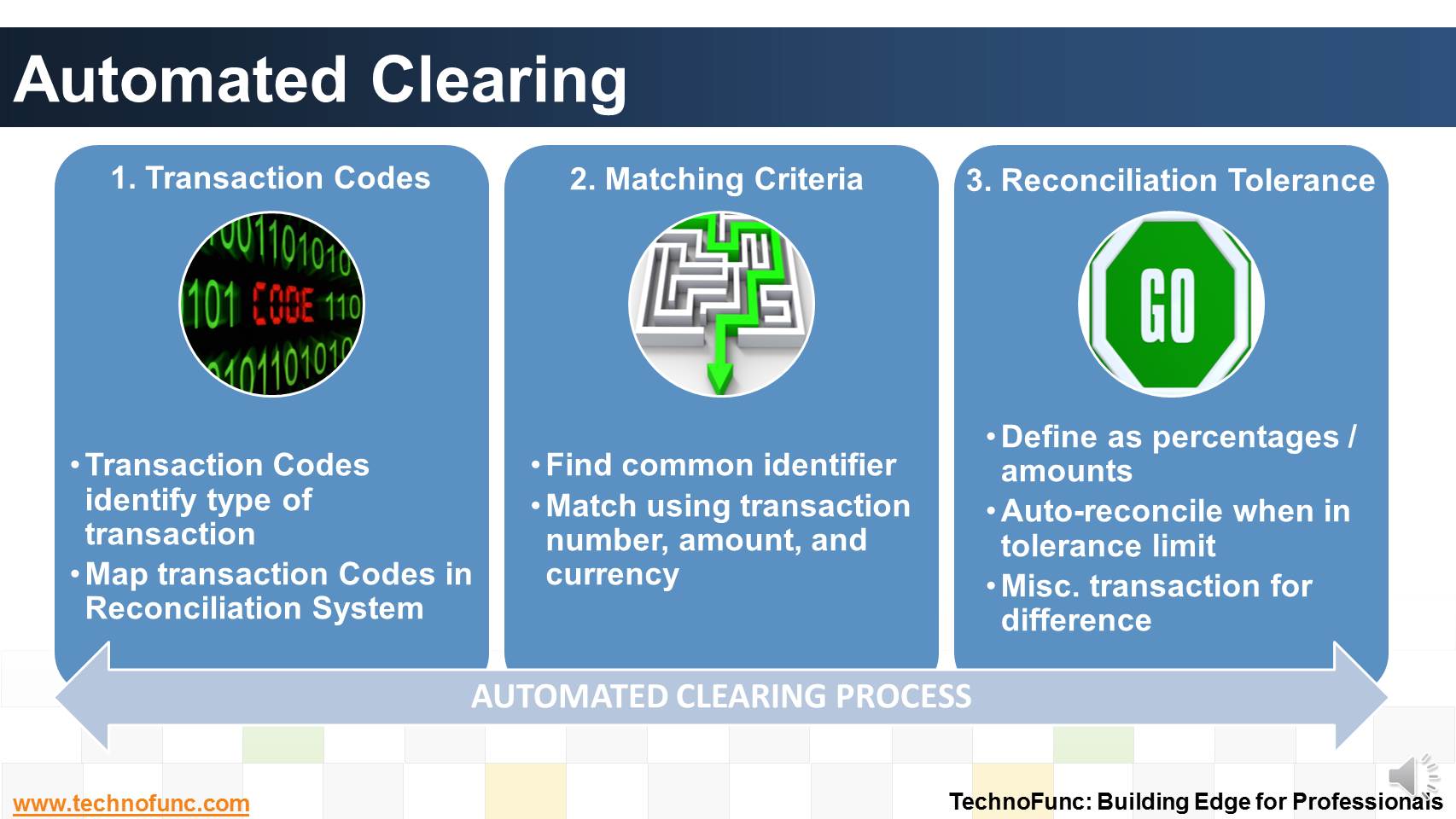- Home
- Business Processes
- Industry Knowledge
- Aerospace Industry
- Automotive Industry
- Banking Domain
- BFSI Industry
- Consumer/ FMCG Industry
- Chemicals Industry
- Engineering & Construction
- Energy Industry
- Education Domain
- Finance Domain
- Hospitality Domain
- Healthcare Industry
- Insurance Domain
- Retail Industry
- Travel and Tourism Domain
- Telecom Industry
- Leadership Skills
- eLearning
- Home
- Business Processes
- Cash Management
- Automated Clearing
Automated Clearing
In automated clearing, Bank statement details are automatically matched and reconciled with system transactions. Learn how this process works and what are the perquisites to enable the same.
Automated Clearing
In automated clearing, Bank statement details are automatically matched and reconciled with system transactions.
This method is ideally suited for bank accounts that have a high volume of transactions.
The following three are the basic steps are involved in Automated Clearing Process:
1 Map Transaction Codes
Bank statement lines are coded to identify the type of transaction the line represents. Since each bank might use a different set of transaction codes, the first step towards automatic clearing is to map each code that is used by a particular bank for which the transactions need to be reconciled.
2 Matching Criteria
Automated matching can only be done if you can find a common identifier between the transaction details as recorded in your sub ledgers and the bank statement.
Automated systems generally match a bank statement line against a payables payment transaction, receivables receipt transaction, payroll disbursals and miscellaneous transactions using a transaction number (such as the payment or deposit number), bank account, amount, and currency.
3 Reconciliation Tolerance:
Reconciliation tolerances are defined in the system as percentages and/or amounts.
If tolerance is defined then the difference between the statement line and sub-ledger transaction line will be auto-reconciled when it is within the tolerance limit. The system also creates a miscellaneous transaction for the difference between the remittance batch amount and the bank statement line.

Related Links
You May Also Like
-
Suspense and clearing accounts resemble each other in many respects but there exists important fundamental difference between the two. Read more to explore these differences.
-
Account Reconciliation – How? Learn the three key attributes to perfom account reconciliation.
-
The objective of funding Management is to implement strategies that lead to the best borrowing rates and lower investment costs. Learn how treasury aids in loans and investment management functions.
-
So many codes in the lines that are there in a Bank Statement. It contain lots and lots of meaningful information that can help automated many tasks. Explore more!
-
Effectively using cash management with trade finance products brings tangible benefits to both corporates and financial institutions.Learn the various benefits of cash management process.
-
Have you ever wondered what is actually a Bank Statement and why it is needed. What is the information that is available in a bank statement?
-
Treasury has increasingly become a strategic business partner across all areas of the business, adding value to the operating divisions of the company. Managing activities that were traditionally carried out within the general finance function. Learn about the drivers for this change.
-
In the previous article we talked about the meaning of the account reconciliations. Now as you now the definition of account reconciliation, in this article let us see why it is carried out.
-
The Cash Management component ensures that the enterprise has sufficient liquidity for payments that are due and to monitor payment flows. Learn how treasury plays an important role in cash management for the enterprise.
Explore Our Free Training Articles or
Sign Up to Start With Our eLearning Courses

About Us
Learning
© 2023 TechnoFunc, All Rights Reserved











